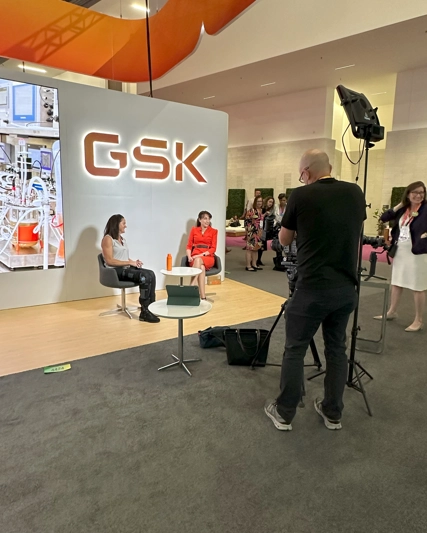For media and investors only
GSK receives US FDA file acceptance for Jemperli (dostarlimab-gxly) plus chemotherapy for the treatment of dMMR/MSI-H primary advanced or recurrent endometrial cancer
- Submission accepted for Priority Review
- Breakthrough Therapy designation granted for this potential indication
- Application being reviewed under the FDA Project Orbis framework, which enables concurrent reviews among US, Australia, Canada, Switzerland, Singapore and United Kingdom health authorities
Issued: London, UK
GSK plc (LSE/NYSE: GSK) today announced the US Food and Drug Administration (FDA) accepted the supplemental Biologics License Application (sBLA) forJemperli (dostarlimab-gxly) in combination with chemotherapy for the treatment of adult patients with mismatch repair deficient (dMMR)/microsatellite instability-high (MSI-H) primary advanced or recurrent endometrial cancer. If approved in this patient population, dostarlimab-gxly plus chemotherapy could represent the first meaningful frontline treatment advancement in decades for patients with primary advanced or recurrent endometrial cancer.
The FDA granted Priority Review for this application and assigned a Prescription Drug User Fee Act action date of September 23, 2023. Dostarlimab-gxly was also recently granted Breakthrough Therapy designation for this potential new indication.
Under Project Orbis, an initiative from the FDA Oncology Center of Excellence that provides a framework for concurrent submission and review of oncology products among international partners, the dostarlimab-gxly sBLA will be reviewed by health authorities in the US, Australia, Canada, Switzerland, Singapore and the United Kingdom.
Hesham Abdullah, Senior Vice President, Global Head of Oncology Development, GSK said: “We are excited about this initial filing for this potential new indication for dostarlimab-gxly in the patient population that demonstrated the strongest treatment effect in the phase III RUBY trial. Long-term outcomes for patients with primary advanced or recurrent endometrial cancer remain poor, and there is an urgent need to evolve the current standard of care, which is platinum-based chemotherapy. We look forward to working with the FDA and other health authorities as they review this application.”
Endometrial cancer is the most common gynecologic cancer in developed countries,[1] and there are about 60,000 new cases of endometrial cancer diagnosed every year in the US.[2] Approximately 15-20% of patients with endometrial cancer will be diagnosed with advanced disease at the time of diagnosis.[3][4] An estimated 20-29% of all endometrial cancers are dMMR/MSI-H.[5] Chemotherapy used alone is the current standard of care for primary advanced or recurrent endometrial cancer, and many patients eventually experience disease progression.[6]
Currently, in endometrial cancer, dostarlimab-gxly is approved in the US as monotherapy in dMMR recurrent or advanced endometrial cancer that has progressed on or following a prior platinum-containing regimen. If the sBLA is approved, dostarlimab-gxly could potentially be indicated earlier in treatment in combination with platinum-containing chemotherapy for patients with dMMR/MSI-H primary advanced or recurrent endometrial cancer.
The sBLA is based on the prespecified interim analysis results from Part 1 of the RUBY/ENGOT-EN6/GOG3031/NSGO phase III trial. The trial met its primary endpoint of investigator-assessed progression-free survival (PFS), which demonstrated a statistically significant and clinically meaningful benefit in patients treated with dostarlimab-gxly plus carboplatin-paclitaxel in the dMMR/MSI-H population and in the overall population. The data reflect a robust median duration of follow-up of ≥24.8 months. The safety and tolerability analysis from RUBY showed a safety profile for dostarlimab-gxly and carboplatin-paclitaxel that was generally consistent with the known safety profiles of the individual agents. These data were presented at the European Society for Medical Oncology (ESMO) Virtual Plenary and Society of Gynecologic Oncology (SGO) Annual Meeting on March 27, 2023, and were simultaneously published in The New England Journal of Medicine.
Part 1 of the RUBY trial continues to assess the dual-primary endpoint of overall survival (OS) in the intent-to-treat (ITT) population. At the first interim analysis in the ITT population, a clinically meaningful OS trend was observed among patients receiving dostarlimab plus chemotherapy followed by dostarlimab. The OS analysis was done at 33% maturity and statistical significance was not reached.
In April, the European Medicines Agency (EMA) validated GSK’s marketing authorization application for dostarlimab-gxly plus chemotherapy for the treatment of dMMR/MSI-H primary advanced or recurrent endometrial cancer.
About endometrial cancer
Endometrial cancer is found in the inner lining of the uterus, known as the endometrium. Endometrial cancer is the most common gynecologic cancer in developed countries, with approximately 417,000 new cases reported each year worldwide[7], and incidence rates are expected to rise by almost 40% by 2040.[8][9] Approximately 15-20% of patients with endometrial cancer will be diagnosed with advanced disease at the time of diagnosis.[10]
About RUBY
RUBY is a two-part global, randomized, double-blind, multicenter phase III trial of patients with primary advanced or recurrent endometrial cancer. Part 1 is evaluating dostarlimab-gxly plus carboplatin-paclitaxel followed by dostarlimab-gxly versus carboplatin-paclitaxel plus placebo followed by placebo. Part 2 is evaluating dostarlimab-gxly plus carboplatin-paclitaxel followed by dostarlimab-gxly plus niraparib versus placebo plus carboplatin-paclitaxel followed by placebo. The primary endpoints in Part 1 are investigator-assessed PFS based on the Response Evaluation Criteria in Solid Tumors v1.1 and OS. The statistical analysis plan included pre-specified analyses of PFS in the dMMR/MSI-H and ITT populations and OS in the overall population. Pre-specified exploratory analyses of PFS in the MMRp/MSS population and OS in the dMMR/MSI-H populations were also performed. RUBY Part 1 included a broad population, including histologies often excluded from clinical trials and had approximately 10% of patients with carcinosarcoma and 20% with serous carcinoma. In Part 2, the primary endpoint is investigator-assessed PFS. Secondary endpoints in Part 1 and Part 2 include PFS per blinded independent central review, overall response rate, duration of response, disease control rate, patient-reported outcomes, and safety and tolerability.
About Jemperli (dostarlimab-gxly)
Jemperli is a programmed death receptor-1 (PD-1)-blocking antibody that binds to the PD-1 receptor and blocks its interaction with the PD-1 ligands PD-L1 and PD-L2.[11]
Jemperli is not approved anywhere in the world for use in combination with standard-of-care chemotherapy (carboplatin-paclitaxel) followed by dostarlimab-gxly for primary advanced or recurrent endometrial cancer.
Jemperli was discovered by AnaptysBio, Inc. and licensed to TESARO, Inc., under a collaboration and exclusive license agreement signed in March 2014. The collaboration has resulted in three monospecific antibody therapies that have progressed into the clinic. These are: Jemperli (GSK4057190), a PD-1 antagonist; cobolimab, (GSK4069889), a TIM-3 antagonist; and GSK4074386, a LAG-3 antagonist. GSK is responsible for the ongoing research, development, commercialisation, and manufacturing of each of these medicines under the agreement.
Indications and Important Safety Information for JEMPERLI (dostarlimab-gxly)
JEMPERLI is indicated for the treatment of adult patients with mismatch repair deficient (dMMR) recurrent or advanced:
- endometrial cancer (EC), as determined by an FDA-approved test, that has progressed on or following prior treatment with a platinum-containing regimen in any setting and are not candidates for curative surgery or radiation, or
- solid tumors, as determined by an FDA-approved test, that have progressed on or following prior treatment and who have no satisfactory alternative treatment options. This indication is approved under accelerated approval based on tumor response rate and durability of response. Continued approval for this indication may be contingent upon verification and description of clinical benefit in a confirmatory trial(s).
Important Safety Information
Severe and Fatal Immune-Mediated Adverse Reactions
- Immune-mediated adverse reactions, which can be severe or fatal, can occur in any organ system or tissue and can occur at any time during or after treatment with a PD-1/PD-L1–blocking antibody, including JEMPERLI.
- Monitor closely for signs and symptoms of immune-mediated adverse reactions. Evaluate liver enzymes, creatinine, and thyroid function tests at baseline and periodically during treatment. For suspected immune-mediated adverse reactions, initiate appropriate workup to exclude alternative etiologies, including infection. Institute medical management promptly, including specialty consultation as appropriate.
- Based on the severity of the adverse reaction, withhold or permanently discontinue JEMPERLI. In general, if JEMPERLI requires interruption or discontinuation, administer systemic corticosteroids (1 to 2 mg/kg/day prednisone or equivalent) until improvement to ≤Grade 1. Upon improvement to ≤Grade 1, initiate corticosteroid taper and continue to taper over at least 1 month. Consider administration of other systemic immunosuppressants in patients whose immune-mediated adverse reaction is not controlled with corticosteroids.
Immune-Mediated Pneumonitis
- JEMPERLI can cause immune-mediated pneumonitis, which can be fatal. In patients treated with other PD-1/PD-L1–blocking antibodies, the incidence of pneumonitis is higher in patients who have received prior thoracic radiation. Pneumonitis occurred in 2.3% (14/605) of patients, including Grade 2 (1.3%), Grade 3 (0.8%), and Grade 4 (0.2%) pneumonitis.
Immune-Mediated Colitis
- Colitis occurred in 1.3% (8/605) of patients, including Grade 2 (0.7%) and Grade 3 (0.7%) adverse reactions. Cytomegalovirus infection/reactivation have occurred in patients with corticosteroid-refractory immune-mediated colitis. In such cases, consider repeating infectious workup to exclude alternative etiologies.
Immune-Mediated Hepatitis
- JEMPERLI can cause immune-mediated hepatitis, which can be fatal. Grade 3 hepatitis occurred in 0.5% (3/605) of patients.
Immune-Mediated Endocrinopathies
- Adrenal Insufficiency
- Adrenal insufficiency occurred in 1.2% (7/605) of patients, including Grade 2 (0.5%) and Grade 3 (0.7%). For Grade 2 or higher adrenal insufficiency, initiate symptomatic treatment per institutional guidelines, including hormone replacement as clinically indicated. Withhold or permanently discontinue JEMPERLI depending on severity.
- Hypophysitis
- JEMPERLI can cause immune-mediated hypophysitis. Grade 2 hypophysitis occurred in 0.2% (1/605) of patients. Initiate hormone replacement as clinically indicated. Withhold or permanently discontinue JEMPERLI depending on severity.
- Thyroid Disorders
- Grade 2 thyroiditis occurred in 0.5% (3/605) of patients. Grade 2 hypothyroidism occurred in 7.6% (46/605) of patients. Hyperthyroidism occurred in 2.3% (14/605) of patients, including Grade 2 (2.1%) and Grade 3 (0.2%). Initiate hormone replacement or medical management of hyperthyroidism as clinically indicated. Withhold or permanently discontinue JEMPERLI depending on severity.
- Type 1 Diabetes Mellitus, Which Can Present with Diabetic Ketoacidosis
- JEMPERLI can cause type 1 diabetes mellitus, which can present with diabetic ketoacidosis. Grade 3 type 1 diabetes mellitus occurred in 0.2% (1/605) of patients. Monitor patients for hyperglycemia or other signs and symptoms of diabetes. Initiate treatment with insulin as clinically indicated. Withhold or permanently discontinue JEMPERLI depending on severity.
Immune-Mediated Nephritis with Renal Dysfunction
- JEMPERLI can cause immune-mediated nephritis, which can be fatal. Grade 2 nephritis, including tubulointerstitial nephritis, occurred in 0.5% (3/605) of patients.
Immune-Mediated Dermatologic Adverse Reactions
- JEMPERLI can cause immune-mediated rash or dermatitis. Bullous and exfoliative dermatitis, including Stevens-Johnson syndrome (SJS), toxic epidermal necrolysis (TEN), and drug rash with eosinophilia and systemic symptoms (DRESS), have occurred with PD-1/PD-L1–blocking antibodies. Topical emollients and/or topical corticosteroids may be adequate to treat mild to moderate non-bullous/exfoliative rashes. Withhold or permanently discontinue JEMPERLI depending on severity.
Other Immune-Mediated Adverse Reactions
- The following clinically significant immune-mediated adverse reactions occurred in <1% of the 605 patients treated with JEMPERLI or were reported with the use of other PD-1/PD-L1–blocking antibodies. Severe or fatal cases have been reported for some of these adverse reactions.
- Nervous System: Meningitis, encephalitis, myelitis and demyelination, myasthenic syndrome/myasthenia gravis, Guillain-Barre syndrome, nerve paresis, autoimmune neuropathy
- Cardiac/Vascular: Myocarditis, pericarditis, vasculitis
- Ocular: Uveitis, iritis, other ocular inflammatory toxicities. Some cases can be associated with retinal detachment. Various grades of visual impairment to include blindness can occur
- Gastrointestinal: Pancreatitis, including increases in serum amylase and lipase levels, gastritis, duodenitis
- Musculoskeletal and Connective Tissue: Myositis/polymyositis, rhabdomyolysis and associated sequelae including renal failure, arthritis, polymyalgia rheumatica
- Endocrine: Hypoparathyroidism
- Other (Hematologic/Immune): Autoimmune hemolytic anemia, aplastic anemia, hemophagocytic lymphohistiocytosis, systemic inflammatory response syndrome, histiocytic necrotizing lymphadenitis (Kikuchi lymphadenitis), sarcoidosis, immune thrombocytopenia, solid organ transplant rejection
Infusion-Related Reactions
- Severe or life-threatening infusion-related reactions have been reported with PD-1/PD-L1–blocking antibodies. Severe infusion-related reactions (Grade 3) occurred in 0.2% (1/605) of patients receiving JEMPERLI. Monitor patients for signs and symptoms of infusion-related reactions. Interrupt or slow the rate of infusion or permanently discontinue JEMPERLI based on severity of reaction.
Complications of Allogeneic HSCT
- Fatal and other serious complications can occur in patients who receive allogeneic hematopoietic stem cell transplantation (HSCT) before or after treatment with a PD-1/PD-L1–blocking antibody, which may occur despite intervening therapy. Monitor patients closely for transplant-related complications and intervene promptly.
Embryo-Fetal Toxicity and Lactation
- Based on its mechanism of action, JEMPERLI can cause fetal harm. Advise pregnant women of the potential risk to a fetus. Advise females of reproductive potential to use effective contraception during treatment with JEMPERLI and for 4 months after their last dose. Because of the potential for serious adverse reactions from JEMPERLI in a breastfed child, advise women not to breastfeed during treatment with JEMPERLI and for 4 months after their last dose.
Common Adverse Reactions
The most common adverse reactions (≥20%) in patients with dMMR EC were fatigue/asthenia, anemia, rash, nausea, diarrhea, constipation, and vomiting. The most common Grade 3 or 4 laboratory abnormalities (>2%) were decreased lymphocytes, decreased sodium, increased alanine aminotransferase, increased creatinine, decreased neutrophils, decreased albumin, and increased alkaline phosphatase.
The most common adverse reactions (≥20%) in patients with dMMR solid tumors were fatigue/asthenia, anemia, diarrhea, and nausea. The most common Grade 3 or 4 laboratory abnormalities (≥2%) were decreased lymphocytes, decreased sodium, increased alkaline phosphatase, and decreased albumin. Please see the full US Prescribing Information.
GSK in oncology
GSK is committed to maximizing patient survival through transformational medicines. GSK’s pipeline is focused on immuno-oncology, tumor cell targeting therapies and synthetic lethality. Our goal is to achieve a sustainable flow of new treatments based on a diversified portfolio of investigational medicines utilizing modalities such as small molecules, antibodies, and antibody-drug conjugates, either alone or in combination.
About GSK
GSK is a global biopharma company with a purpose to unite science, technology, and talent to get ahead of disease together. Find out more at gsk.com.
Cautionary statement regarding forward-looking statements
GSK cautions investors that any forward-looking statements or projections made by GSK, including those made in this announcement, are subject to risks and uncertainties that may cause actual results to differ materially from those projected. Such factors include but are not limited to those described under Item 3.D 'Risk factors” in the company's Annual Report on Form 20-F for 2022, GSK’s Q1 Results for 2023 and any impacts of the COVID-19 pandemic.
References
[1]Faizan U, Muppidi V. Uterine Cancer. [Updated 2022 Sep 5]. In: StatPearls [Internet]. Treasure Island (FL): StatPearls Publishing; 2022 Jan-. Available at: https://www.ncbi.nlm.nih.gov/books/NBK562313/.
[2]American Cancer Society. Key Statistics For Endometrial Cancer. https://www.cancer.org/cancer/endometrial-cancer/about/key-statistics.html. Updated February 14, 2022. Accessed March 29, 2023.
[3]Cerner Enviza CancerMPact® Patient Metrics 2022. CMP:CancerMPact® [Patient Metrics], Cerner Enviza. Available from www.cancermpact.com. Accessed 11 May 2023.
[4]CancerMPact® [Treatment Architecture], Cerner Enviza. Available from www.cancermpact.com. Accessed 11 May 2023.
[5]Cerner Enviza CancerMPact® [Treatment Architecture]. Available from www.cancermpact.com. Accessed 14 Apr 2023.
[6]Halla K. Emerging Treatment Options for Advanced or Recurrent Endometrial Cancer. J Adv Pract Oncol. 2022 Jan;13(1):45-59. doi: 10.6004/jadpro.2022.13.1.4. Epub 2022 Feb 1. PMID: 35173988; PMCID: PMC8805805.
[7]Faizan U, Muppidi V. Uterine Cancer. [Updated 2022 Sep 5]. In: StatPearls [Internet]. Treasure Island (FL): StatPearls Publishing; 2022 Jan-. Available at: https://www.ncbi.nlm.nih.gov/books/NBK562313/.
[8]Braun MM, et al. Am Fam Physician. 2016;93(6):468-474.
[9] International Research on Cancer. Global Cancer Observatory. Cancer Tomorrow. https://gco.iarc.fr/tomorrow/en/dataviz/. Accessed 13 July 2022.
[10]Kantar Health, Cust Study (2018).
[11]Laken H, Kehry M, Mcneeley P, et al. Identification and characterization of TSR-042, a novel anti-human PD-1 therapeutic antibody. European Journal of Cancer. 2016;69,S102. doi:10.1016/s0959-8049(16)32902-1.


